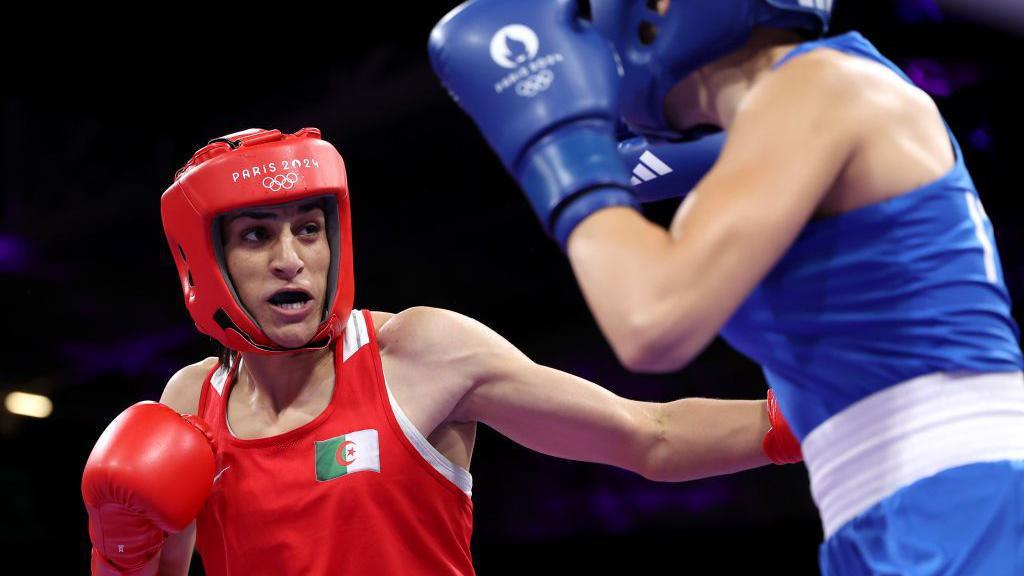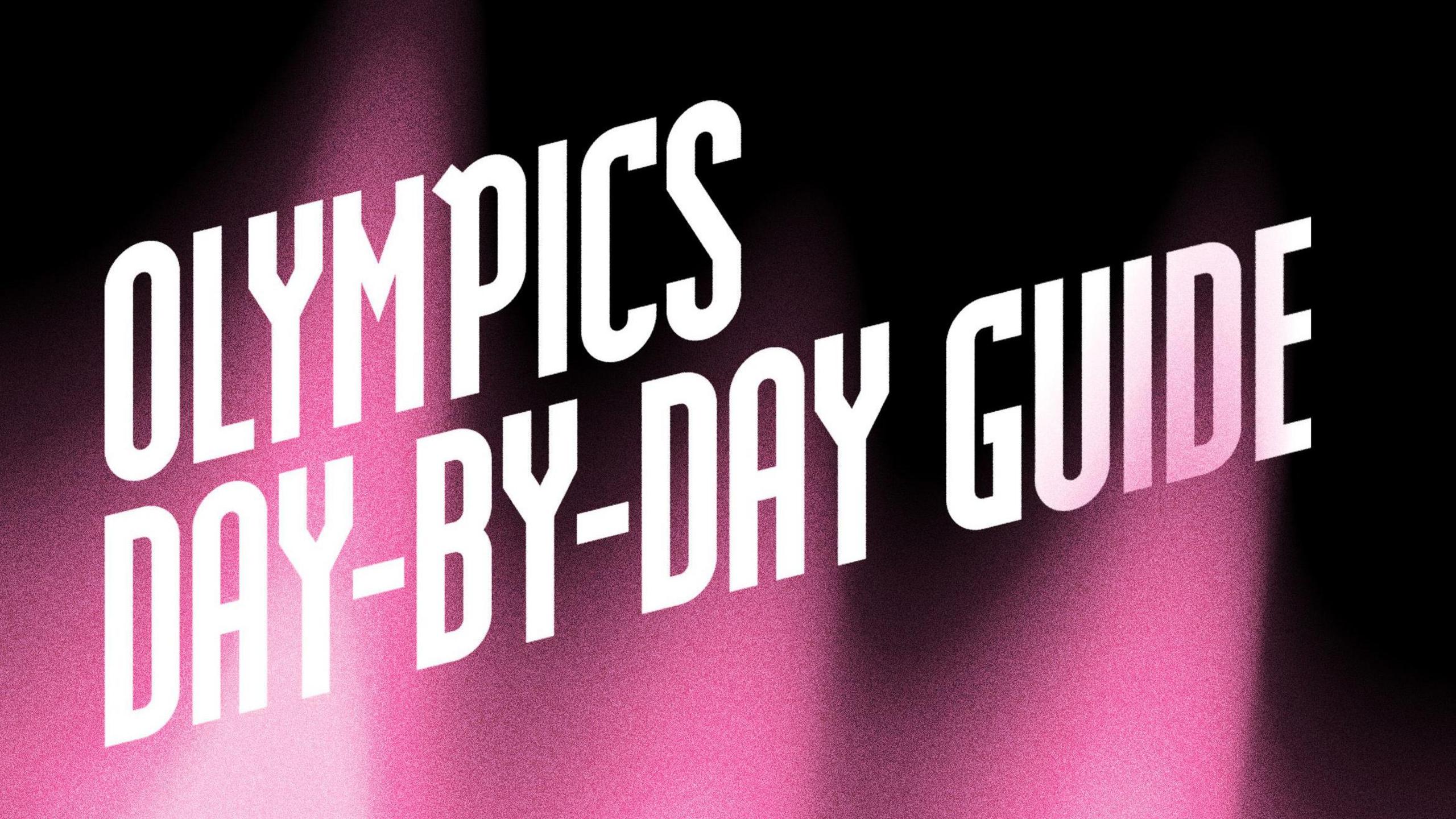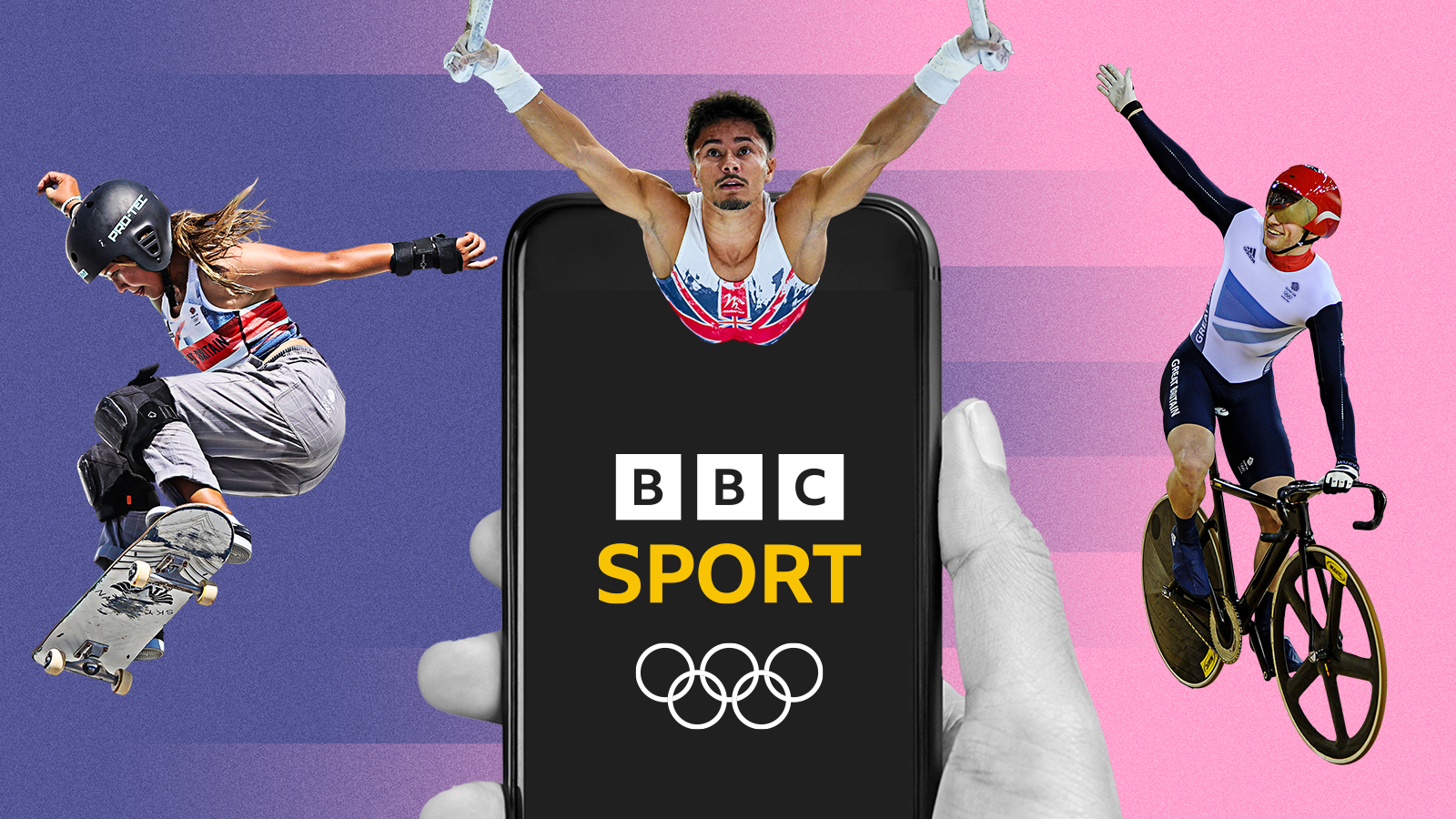Boxing controversy - what we know and what we don't

Imane Khelif beat Angela Carini on Thursday
- Published
Algeria's Imane Khelif and Taiwan's Lin Yu-ting have been cleared to compete at the Paris Olympics despite being disqualified from last year's World Championships after they were said to have failed gender eligibility tests.
Khelif, 25, is guaranteed at least a bronze medal after beating Hungarian Luca Anna Hamori in Saturday's welterweight quarter-final.
Lin competes in the featherweight quarter-final on Sunday after victory over Uzbekistan's Sitora Turdibekova.
Their participation in the Games has proved controversial given their disqualifications in 2023.
Earlier this week Khelif's first bout was abandoned after 46 seconds by Italian opponent Angela Carini.
This led to some criticising the International Olympic Committee (IOC) for allowing the entry of a boxer who it is said previously failed to meet gender eligibility criteria.
Italian Carini said she ended the fight to "preserve her life", but apologised to her Algerian opponent on Friday, saying "if the IOC said she can fight, I respect that decision".
Khelif, speaking after her victory, said: "I'm here for the gold - I fight everybody."
Lin won her first fight at Paris 2024 on Friday - the 28-year-old entering the arena to cheers and some boos - before beating Turdibekova in the 57kg category.
The International Boxing Association (IBA), which was the previous organiser of Olympic boxing, has been a vocal critic of the IOC's decision to permit the two athletes to compete.
Here BBC Sport takes you through some of the key questions around the topic.
What sex were Khelif and Lin recorded at birth? Were they born biologically male or female?
Khelif has always competed in the women's division and is recognised by the IOC as a female athlete.
"The Algerian boxer was born female, was registered female, lived her life as a female, boxed as a female, has a female passport," IOC spokesperson Mark Adams said on Friday.
"This is not a transgender case. There has been some confusion that somehow it's a man fighting a woman. This is just not the case. On that there is consensus, scientifically this is not a man fighting a woman."
Khelif has spoken about her experience of growing up as a girl in Algeria and the prejudice she faced playing football alongside boys.
"Don't let obstacles come in your way, resist any obstacles and overcome them," she said in March 2024. "My dream is to win a gold medal.
"If I win, mothers and fathers can see how far their children can go. I particularly want to inspire girls and children who are disadvantaged in Algeria."
There is no suggestion Khelif identifies as anything other than a woman.
Lin has also always competed in the women's division and is recognised by the IOC as a female athlete.
Khelif being in women's boxing not fair, says next opponent
- Published2 August 2024
I want to apologise to Khelif - Italian boxer Carini
- Published2 August 2024
Lin wins controversial first bout at Paris Olympics
- Published2 August 2024
What are their boxing careers to date?
Khelif has been boxing for eight years.
The Algerian made her debut on the world amateur stage at 19, when she came 17th at the 2018 World Championships. A year later, Khelif came 19th in the 2019 Women's World Boxing Championships.
She made her Olympic debut at the 2020 Games in Tokyo. Fighting in the 60kg lightweight division, Khelif was beaten 5-0 at the quarter-final stage by Ireland's eventual gold medallist Kellie Harrington.
She then became the first Algerian boxer to win a World Championship medal, taking silver in 2022 after losing the final to Ireland's Amy Broadhurst, who now represents Britain. Khelif followed that by winning the 2022 African Championships and 2022 Mediterranean Games.
In 2023, she won gold at the Arab Games in the 66kg division and earned her place in the 2024 Games by beating Mozambique's Alcinda Panguana in the final of the African Olympics qualification tournament in Senegal.
To date, Khelif has fought 50 times in her career, winning 41 and losing nine. Six of those victories have come via knockout.
Lin began boxing as a 13-year-old in 2008 and has enjoyed a successful career since making her debut at the elite level in 2017.
She is a two-time world champion - in 2018 and 2022 - and won bronze in 2019.
She is also a two-time Asian champion (2017 and 2019), and a two-time Asian Games medallist - winning gold in 2023 and bronze in 2018.
Lin made her Olympic debut at Tokyo 2020, losing in the last 16 of the featherweight category to Nesthy Petecio.
Of her 58 bouts, she has won 44 and lost 14. She has one victory by knockout.
Why was Khelif's win against Carini controversial?
Italian boxer Carini pulls out after 46 seconds of fight
Khelif's victory attracted controversy after Carini conceded in just 46 seconds.
Much of the criticism from some people stems from Khelif's disqualification at the 2023 World Championships in New Delhi, India.
She failed a gender eligibility test conducted by the IBA hours before her gold-medal showdown against China's Yang Liu. The Algerian initially appealed against the decision to the Court of Arbitration of Sport (Cas), but withdrew her appeal during the process, the IBA said.
The Russian-led IBA said Khelif "failed to meet the eligibility criteria for participating in the women's competition, as set and laid out in the IBA regulations".
According to the IBA's regulations: "Boxers will compete against boxers of the same gender, meaning women vs women and men vs men as per the definitions of these rules.
The IBA defines a woman, female or girl as "an individual with chromosome XX" and men, males or boys as "an individual with chromosome XY".
The IBA denied Khelif's testosterone levels had been tested.
In an interview with BBC sports editor Dan Roan on Thursday, IBA chief executive Chris Roberts said XY chromosomes were found in "both cases".
Roberts said there were "different strands involved in that" and therefore the body could not commit to referring to Khelif as "biologically male".
He said the unspecified eligibility tests had been conducted as a result of “ongoing concerns” raised by other fighters, coaches and the IBA’s medical committee.
The IOC has raised doubts over the accuracy of the tests.
"We don't know what the protocol was, we don't know whether the test was accurate, we don't know whether we should believe the test," said IOC spokesperson Adams.
"There's a difference between a test taking place and whether we accept the accuracy or even the protocol of the test."
The BBC has, as yet, been unable to determine what the eligibility tests consisted of.
Speaking on Saturday, Yacine Arab, the sport manager of the Algeria National Olympic Committee, was asked by BBC sports editor Dan Roan why Khelif had failed the IBA test.
He said: "We don't know. They said she was positive and her testosterone is very very high.
"Then the medical president of the IOC said that it's really normal in boxing that the athletes' testosterone is high. For all the girls it is the same. Imane is not alone in this case."
What happened with Lin at the 2023 World Championships?
At the same 2023 World Championships, Lin was stripped of a bronze medal by the IBA.
The IOC said on its media information portal earlier this week that she had failed to meet "eligibility requirements based on the results of a biochemical test".
It added: "It was the first time a Chinese Taipei athlete had been required to take a biochemical test for gender eligibility since the IBA started to use the new testing method."
The IOC removed this information from its portal later in the week.
In a statement on Thursday, the IOC said instead that Khelif and Lin had been "victims of a sudden and arbitrary decision by the IBA".
"Towards the end of the IBA World Championships in 2023, they were suddenly disqualified without any due process," the IOC said.
"According to the IBA minutes available on their website, this decision was initially taken solely by the IBA secretary general and CEO. The IBA board only ratified it afterwards and only subsequently requested that a procedure to follow in similar cases in the future be established and reflected in the IBA Regulations. The minutes also say that the IBA should 'establish a clear procedure on gender testing'.
"The current aggression against these two athletes is based entirely on this arbitrary decision, which was taken without any proper procedure - especially considering that these athletes had been competing in top-level competition for many years.
"Such an approach is contrary to good governance."
The IBA insisted its decision was "necessary to uphold the level of fairness and utmost integrity of the competition".
It said in a statement earlier this week: "The athletes did not undergo a testosterone examination but were subject to a separate and recognised test, whereby the specifics remain confidential. This test conclusively indicated that both athletes did not meet the required necessary eligibility criteria and were found to have competitive advantages over other female competitors."
The IBA said Lin did not appeal against the IBA's decision to Cas, "thus rendering the decision legally binding".
Some reports in Taiwan in 2023 suggested, external Lin's test failure was due to "weight control and menstrual cycle" medication that affected hormonal levels.
What has changed in Olympic boxing regulation and governance since the IBA's decision?
Unlike previous Games, boxing at the Tokyo Olympics was organised by the IOC rather than the IBA.
The IOC suspended the IBA in 2019 because of concerns over its finances, governance, ethics, refereeing and judging.
Having failed to meet required reforms set out by the IOC, the IBA was stripped of its status as the sport's world governing body in 2023. That decision was upheld in April 2024 by Cas following an appeal.
The IOC's decision to strip the IBA of its status came four months after the body disqualified Khelif and Lin from the World Championships.
In 2021, the IOC released a framework on 'Fairness, Inclusion and Non-Discrimination on the Basis of Gender Identity and Sex Variations', external.
The document sets out 10 principles - not rules - for national bodies to follow when selecting athletes for the Games.
The IOC said it "supports the participation of any athlete who has qualified and met the eligibility criteria to compete in the Olympic Games as established by their IF (International Federation). The IOC will not discriminate against an athlete who has qualified through their IF (International Federation), on the basis of their gender identity and/or sex characteristics."
What testing is conducted in boxing?
In 2019, the IOC delegated responsibility for the organisation and management of doping control at the Olympics to the International Testing Agency (ITA).
The IOC said it took a "zero-tolerance policy" to anyone found using or providing doping products.
Tests include, but are not excluded to, determining an athlete's levels of testosterone.
"There are many women with higher levels of testosterone than men," said IOC spokesperson Adams.
"So the idea that a testosterone test is a magic bullet is actually not true."
Is this a transgender debate?
No.
There is no suggestion that Khelif or Lin identify as transgender.
Some reports have taken the IBA statement that the boxers have XY chromosomes to speculate they might have differences of sexual development (DSD) like runner Caster Semenya.
However, the BBC has not been able to confirm whether this is or is not the case.
On Saturday, IOC president Thomas Bach told a news conference this was not a "DSD case" - but later issued a correction.
He had told journalists at the IOC daily briefing: "We are not talking about the transgender issue here. This is about a woman taking part in a women's competition.
"I repeat, this is not a DSD case."
The IOC later posted a correction on social media , external saying Bach did not mean to say it was "not a DSD case", he was meant to say "this is a not a transgender case".
In posting their correction they did not give any further details on whether this is a DSD case.
After Khelif's fight on Saturday, Algeria Olympic Committee sport manager Arab was asked if she was a DSD athlete.
"When she arrived at the village she did this test," he added. "Do you think if she was positive they would let her fight? Never. She did all the tests – even the tests for pregnancy. All the tests were negative.
"Today the IOC president sent a message to the sporting world that this [situation] is a joke.
"Imane was born a girl, she fights as a girl and she is a girl. I told Imane the IOC sent this message and she's very happy."
DSD is a group of rare conditions, whereby a person's hormones, genes and/or reproductive organs may be a mix of male and female characteristics.
Some of those affected prefer the term "intersex", which is an umbrella term used to describe people who are born with biological variations in their sex characteristics that don't fit typical male or female categories.
Other sports have rules in place for athletes with DSD, whose elevated testosterone levels can lead to increased muscle mass and strength.
World Athletics, for example, only allows athletes with DSD to compete in female track events if they reduce their testosterone levels.
When do Khelif and Lin next fight?
Lin faces Bulgarian Svetlana Kamenova Staneva - the featherweight European champion - in the quarter-final on Sunday at 10:00 BST.
Khelif takes on Thailand's Janjaem Suwannapheng in Tuesday's welterweight semi-final.
What have people said?
"It matters to be able to compete on equal grounds and, from my point of view, it was not an even contest," - Italian Prime Minister Giorgia Meloni.
"She has been condemned by a test no-one has seen and it has become an established fact. Everything else is pure and utter down to invention. I think it has hurt Olympic boxing at a crucial time where its future is still being discussed. It's an absolute disaster," Steve Bunce, 5 Live commentator
"If you've got one boxer who far outweighs the strength of another based against eligibility criteria and testing, that would suggest that that person is not fit to be within the female category of the competition," Chris Roberts, CEO of IBA
"I would urge we try to take the culture war out of this and actually address the issues and the people and think about the people concerned and the real damage that is being done by misinformation," Mark Adams, IOC spokesperson.
"It was an incredibly uncomfortable watch for the 46 seconds that it lasted and I know there is a lot of concern about women competitors about whether we are getting the balance right in not just in boxing but other sports as well," Lisa Nandy, Secretary of State for Culture, Media and Sport.
Related topics
- Published10 August 2024

- Published26 July 2024

